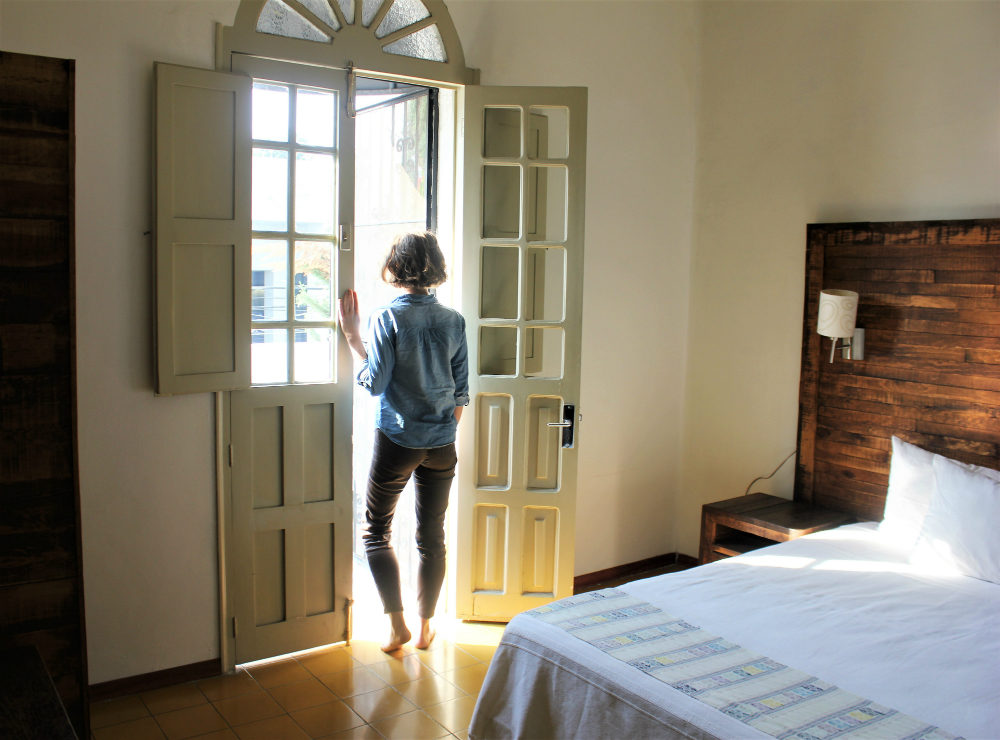How to Overcome Jet Lag and Adjust to a New Time Zone

I love that feeling of overwhelming excitement when stepping off a plane in a new place. Except that it’s often shortly followed by a pang of fatigue that’s so bad you can’t shift it. Jet lag is an unfortunate consequence of travelling the world.
Jet lag occurs when we move through multiple time zones and knock our body’s natural sense of time out. It can dampen your first impressions of a place. Even if you’re dying to get out and see all the sights, you simply don’t have the energy. Instead you’ll be curling up with your pillow unsuccessfully trying to sleep off your jet lag.
How to Overcome Jet Lag in 10 Steps
How can travellers overcome jet lag, or at least recover from it faster? After years of travelling, I share my top tips for how to overcome jet lag and adjust to a new time zone.
1. Adjust your bedtime before you fly
If you’re flying to somewhere that’s several hours ahead or behind your time zone, it can be tricky for your body to adjust. You know you should be going to bed, but in your mind it’s only 6pm. Or you’re trying your best to stay awake but it’s 3am where you’ve come from!
Even if you do manage to stay up until an appropriate time, it’s likely that your sleep patterns will be off for a few days. As all the sleep experts say, we humans need our kip. It’s vital for our health and our happiness at any stage of life – but especially when we travel. We need sleep to keep our immune system strong, to give us energy and to enjoy our travels as much as possible.
In the week before you fly, try adjusting your bedtime by a half hour or so every night. You probably won’t be completely in line with your new location but it’s make the adjustment so much easier. Jet lag is often worse when flying east. This is because flying east makes your body think the day is getting shorter. Whereas flying west makes your body think the day is longer. If you’re heard the expression west is best, east is a beast this is why. If you’re flying east, go to bed a little earlier than usual. If you’re flying west, stay up a bit longer than usual.
2. Book a well-timed flight
If jet lag affects you quite badly, consider the time of your flight. How does flight time help you overcome jet lag you ask? Arriving at your destination in the morning can make you feel much worse. You’ll be trying to keep your body awake for a whole day before you can get some shut-eye. If you arrive in the afternoon or evening, then your body can adjust quicker. You’ll be able to give into the urge to go to sleep sooner.
When we flew to Singapore, we arrived at 10AM and dragged ourselves exhausted around the city in the heat all day. Whereas when we flew into Mexico, we arrived in the evening. After making our way to our accommodation and getting a quick bite to eat we hit the hay almost immediately. The next day we woke up ready and excited to explore our new surroundings.

Early morning in Singapore. Charlie drinking coffee after getting off a long-haul flight to Singapore to try and stay awake for the day.
3. Opt for a stopover
As well as a well-timed flight, opting for a stopover on a long-haul trip can also help you to overcome jet lag. A stopover can help your body to adjust more gradually to the changing time zone. In some cases, it can also save you money on flight prices. When we flew to Indonesia last year, we saved £200 per flight by stopping over for 2 nights in Singapore. It was perfect for us because we love to explore new cities. It meant we got to see one extra place on that trip and catch up on our sleep!
4. Adjust your sleep pattern on the plane
5. Avoid the sleeping pills
6. Stay hydrated
7. Eat the right foods on the flight
The food you eat during your flight can also play a role in your jet lag. If you’re served up carbohydrates such as pasta, rice and potatoes in your plane meal, this can make you more tired. That’s great if you’re flying east and need to get in some extra sleep. However, if you’re going the other direction try to avoid carbs and stick with proteins.
8. Book quiet accommodation

9. Take it easy with activities
If you’re flying into Asia, why not treat yourself and book a massage the following day? It’ll help with those aches and pains you’re bound to have after the long flight, plus it’ll probably cost next to nothing too. A great way to relax, to ease into your travels and help you to overcome jet lag. If a massage or spa doesn’t sound like your jam, then stick to light exercise activities. Don’t put too much pressure on yourself to go and see everything all at once. If you try and cram too much in, chances are you’ll burn out. Your body needs time to recover after changing time zones so make sure you’ve accounted for this in your travel itinerary.
10. Sleep at the right time
When you land, if it’s daytime in your new location then don’t let yourself go to sleep. A short nap won’t do any harm but ideally you want to keep yourself awake until the sun sets. If you go straight to bed during the day time, you’ll only knock your body clock even further out and recovering from jet lag will be more difficult. Instead, if you arrive in the day then go outside in the sunlight. Daylight helps the body to regulate its biological clock so you can adjust to the new country you’re in. If you’re arriving at night, then it’s fine to have a light snack and go right to bed.

Enjoy your new destination
There are no hard and fast fixes on how to overcome jet lag, but the above tips can help you to lessen the effects of it. Time your flights as well as you can and consider taking a stopover. Be aware of whether you’re travelling to the east or west so you can plan accordingly. Don’t forget to drink plenty of water and eat carefully. Most importantly, take care of yourself when you arrive at your destination.
Do you have more tips on how to overcome jet lag? Share your experiences of what works for you in the comments below.
This post was written in collaboration with sleepadvisor.org.














